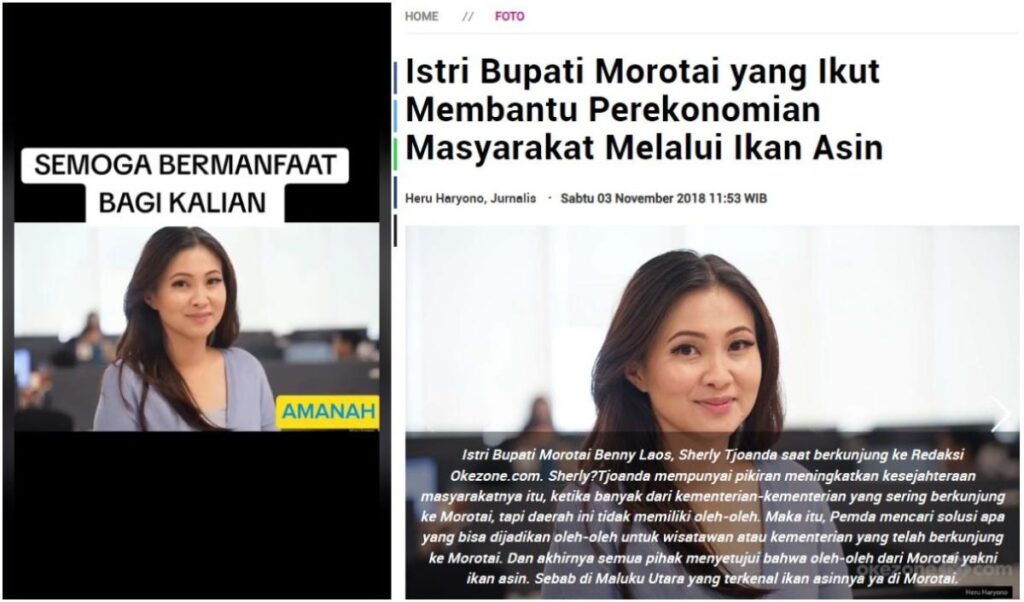In Indonesia, a prevalent issue is the targeting of politicians by online scammers who manipulate edited videos to impersonate them and promote fraudulent financial schemes. Recently, a case emerged involving Sherly Tjoanda, a candidate for governor in North Maluku. An edited TikTok video surfaced, falsely portraying Sherly declaring victory and promising cash assistance to the local populace. The video featured superimposed text that communicated her intention to share financial aid as a gesture of gratitude for her appointment as governor. However, a spokeswoman for her campaign stated that the video did not receive any endorsement from Sherly and was derived from an old photo taken six years prior. The video circulated on social media just as regional election polls closed, raising concerns about misleading information proliferating during a critical electoral period.
The misinformation in the viral video showcased Sherly appearing to claim victory and pledging financial aid, suggesting to viewers that they would receive monetary support from her campaign. This fraudulent video coincided with preliminary vote counts indicating that Sherly was indeed leading in her race. Despite this, the official confirmation of her win did not occur until December 8, with her inauguration planned for February 7, 2025. In addition to spreading false narratives, the video prompted interaction among TikTok users, who expressed support and made requests for assistance, illustrating how easily individuals can be deceived by manipulated digital content.
Expert analysis of the video revealed glaring inconsistencies that raised suspicions about its authenticity. Nurlaela Syarif, Sherly’s campaign spokeswoman, firmly denounced the claims made in the video as fabricated, asserting that no cash handouts were being offered. The fraudulent video bore striking similarities to a previously debunked clip featuring another gubernatorial candidate and mirrored language that suggested it had been crafted using artificial intelligence techniques. Such scams thrive on the anonymity provided by social media platforms, effectively targeting users who might not scrutinize the content critically.
Further investigation employed reverse image searches, leading to the identification of a source photo that had been manipulated to create the misleading video. This photograph, published in a 2018 article on the website Okezone, coincided with Sherly’s previous non-political engagement and did not discuss any cash giveaways related to elections. The original context of the image starkly contrasts with its current use in an attempt to mislead the audience about Sherly’s actions and intentions in the electoral campaign. This manipulation exemplifies the challenges posed by emerging technologies in the realm of political discourse and misinformation.
The frequency of such deceptive tactics highlights a broader trend of refined scamming strategies that exploit the digital landscape in Indonesia. Scammers often operate by requiring users to engage with fake profiles – leaving comments, following pages, or sharing personal data – in exchange for nonexistent goods or services. This not only inflates follower counts for the scammers but also enables the collection of personal data, thereby putting citizens at risk of further scams or data breaches. The combination of political instability and the rapid growth of social media platforms creates a fertile environment for the proliferation of these scams.
In conclusion, the manipulation of video content to deceive the public underscores the urgent need for increased digital literacy, particularly among voters, to discern legitimate information from fabricated narratives. Moreover, as the political landscape in Indonesia continues to evolve, the responsibility lies both with candidates and social media platforms to implement measures that combat misinformation and protect the integrity of electoral processes. The urgency for these actions is intensified by the evident susceptibility of individuals to online deception, emphasizing the importance of proactive measures in safeguarding democracy against electronic fraudulence. Effective strategies to address this issue could ultimately foster a more informed electorate, vital for the health of Indonesia’s democratic environment.

